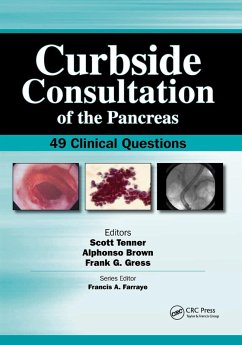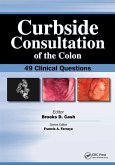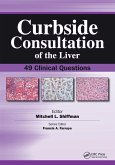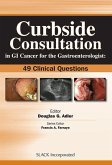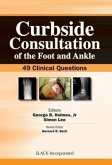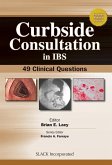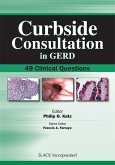Curbside Consultation of the Pancreas
49 Clinical Questions
Herausgeber: Tenner, Scott; Gress, Frank; Brown, Alphonso
Curbside Consultation of the Pancreas
49 Clinical Questions
Herausgeber: Tenner, Scott; Gress, Frank; Brown, Alphonso
- Broschiertes Buch
- Merkliste
- Auf die Merkliste
- Bewerten Bewerten
- Teilen
- Produkt teilen
- Produkterinnerung
- Produkterinnerung
Curbside Consultation of the Pancreas: 49 Clinical Questions provides quick and direct answers to the thorny questions commonly posed during a "curbside consultation" between colleagues.
Andere Kunden interessierten sich auch für
![Curbside Consultation of the Colon Curbside Consultation of the Colon]() Curbside Consultation of the Colon158,99 €
Curbside Consultation of the Colon158,99 €![Curbside Consultation of the Liver Curbside Consultation of the Liver]() Curbside Consultation of the Liver161,99 €
Curbside Consultation of the Liver161,99 €![Curbside Consultation in GI Cancer for the Gastroenterologist Curbside Consultation in GI Cancer for the Gastroenterologist]() Douglas AdlerCurbside Consultation in GI Cancer for the Gastroenterologist162,99 €
Douglas AdlerCurbside Consultation in GI Cancer for the Gastroenterologist162,99 €![Curbside Consultation of the Foot and Ankle Curbside Consultation of the Foot and Ankle]() Curbside Consultation of the Foot and Ankle162,99 €
Curbside Consultation of the Foot and Ankle162,99 €![Curbside Consultation of the Spine Curbside Consultation of the Spine]() Curbside Consultation of the Spine156,99 €
Curbside Consultation of the Spine156,99 €![Curbside Consultation in IBS Curbside Consultation in IBS]() Brian LacyCurbside Consultation in IBS163,99 €
Brian LacyCurbside Consultation in IBS163,99 €![Curbside Consultation in GERD Curbside Consultation in GERD]() Curbside Consultation in GERD156,99 €
Curbside Consultation in GERD156,99 €-
-
-
Curbside Consultation of the Pancreas: 49 Clinical Questions provides quick and direct answers to the thorny questions commonly posed during a "curbside consultation" between colleagues.
Hinweis: Dieser Artikel kann nur an eine deutsche Lieferadresse ausgeliefert werden.
Hinweis: Dieser Artikel kann nur an eine deutsche Lieferadresse ausgeliefert werden.
Produktdetails
- Produktdetails
- Verlag: CRC Press
- Seitenzahl: 262
- Erscheinungstermin: 15. Oktober 2009
- Englisch
- Abmessung: 254mm x 178mm x 14mm
- Gewicht: 500g
- ISBN-13: 9781556428142
- ISBN-10: 1556428146
- Artikelnr.: 26757006
- Herstellerkennzeichnung
- Libri GmbH
- Europaallee 1
- 36244 Bad Hersfeld
- gpsr@libri.de
- Verlag: CRC Press
- Seitenzahl: 262
- Erscheinungstermin: 15. Oktober 2009
- Englisch
- Abmessung: 254mm x 178mm x 14mm
- Gewicht: 500g
- ISBN-13: 9781556428142
- ISBN-10: 1556428146
- Artikelnr.: 26757006
- Herstellerkennzeichnung
- Libri GmbH
- Europaallee 1
- 36244 Bad Hersfeld
- gpsr@libri.de
Scott Tenner, MD, MPH, serves as Director of Medical Education and Research at Maimonides Medical Center, New York. He also serves as an Associate Professor of Medicine at the State University of New York. Dr. Tenner received his doctorate in medicine, his master's in cell biology, and his master's in public health at The George Washington University, Washington, DC. He completed his training in gastroenterology and endoscopy at Brigham and Women's Hospital, Harvard Medical School, Boston. Board certified in both medicine and gastroenterology, he has served as President for the New York Society for Gastrointestinal Endoscopy and currently serves as a Governor and Chair of the National Affairs Committee for the American College of Gastroenterology. Actively involved in teaching and research, Dr. Tenner has authored more than 200 abstracts, papers, chapters, and books. With a focus on diseases of the pancreas, Dr. Tenner is a member of the Research Committee for the American College of Gastroenterology and often serves as a speaker, reviewer, and moderator in subjects of pancreatic disease at national scientific meetings. Despite a busy academic career, Dr. Tenner maintains a busy private practice. He serves as Director of the Brooklyn Gastroenterology and Endoscopy Associates and the Greater New York Endoscopy Surgical Center. Alphonso Brown, MD, MS Clin Epi, is currently a staff physician at The Beth Israel Deaconess Medical Center, a Harvard teaching hospital. He also holds a teaching appointment at Harvard Medical School. He spends his time between patient care duties and the conduct of translational research. Frank G. Gress, MD, is Professor of Medicine and Chief, Division of Gastroenterology and Hepatology at the State University of New York (SUNY), College of Medicine and Downstate Medical Center in Brooklyn, NY. Previously, Dr. Gress was Associate Professor of Medicine at Duke University, Durham, NC and served as Clinical Chief for the Gastroenterology Section at the Durham VA Medical Center. Dr. Gress completed his medical school training at the Mount Sinai School of Medicine in New York, NY; residency in internal medicine at Montefiore Medical Center, Bronx, NY; and his gastroenterology fellowship at the Brooklyn Hospital Center and Methodist Hospital affiliated with SUNY, Health Sciences Center, Brooklyn, NY. After finishing his gastroenterology fellowship, Dr. Gress was awarded the American Society for Gastrointestinal Endoscopy Advanced Endoscopy Scholarship, which was established to support training in advanced therapeutic endoscopy, and he subsequently completed an advanced therapeutic endoscopy fellowship at the Division of Gastroenterology and Hepatology at Indiana University Medical Center in Indianapolis where he trained in the emerging field of endoscopic ultrasound and endoscopic retrograde cholangiopancreatography. Dr. Gress has published more than 80 articles on original research in highly respected peer-review journals and contributed more than 25 chapters to numerous textbooks on such subjects as clinical gastroenterology, rectal cancer, pancreatitis, pancreatic cancer, advanced endoscopy, training simulators for endoscopy, and the clinical applications of endoscopic ultrasound to name a few. He also lectures regularly at regional and national meetings on these subjects. He also co-authored the textbook Endoscopic Ultrasonography, now in its second edition.
Contents Dedication About the Editors Contributing Authors Section I: ACUTE PANCREATITIS Question 1 How Much Fluid Should Be Given During the Initial Management of Acute Pancreatitis? Nison Badalov
MD and Scott Tenner
MD
MPH Question 2 Should I Check a C-Reactive Protein During All Admissions for Pancreatitis? Nison Badalov
MD and Scott Tenner
MD
MPH Question 3 When Should I Consider Performing a Computed Tomography of the Abdomen in Patients With Acute Pancreatitis? Nison Badalov
MD and Scott Tenner
MD
MPH Question 4 When Would You Use Antibiotics in Acute Pancreatitis
and Which Antibiotics Would You Use? Nison Badalov
MD and Scott Tenner
MD
MPH Question 5 What Can Be Done to Minimize Post-Endoscopic Retrograde Cholangiopancreatography Pancreatitis? Nison Badalov
MD and Scott Tenner
MD
MPH Question 6 What Is the Best Approach to Nutrition in Acute Pancreatitis? Shishir K. Maithel
MD and Charles M. Vollmer
Jr
MD Question 7 When Should Gallstones Be Considered the Etiology of Acute Pancreatitis? Nison Badalov
MD and Scott Tenner
MD
MPH Question 8 When Should an Endoscopic Retrograde Cholangiopancreatography Be Performed in Acute Gallstone Pancreatitis? Nison Badalov
MD and Scott Tenner
MD
MPH Question 9 My Patient Had a Single Episode of Uncomplicated Gallstone Pancreatitis. Should He Have a Cholecystectomy
and
if so
When? Nison Badalov
MD and Scott Tenner
MD
MPH Question 10 Should a Cholecystectomy Be Performed on Patients With Acute Pancreatitis
No Gallstones
but Sludge in the Gallbladder? Benjamin E. Young II
MD Question 11 When Would You Perform Surgery in Acute Pancreatitis? Nison Badalov
MD and Scott Tenner
MD
MPH Question 12 What Should Be the Sequence of Investigations for a Patient With Recurrent
Unexplained Acute Pancreatitis? Nison Badalov
MD and Scott Tenner
MD
MPH Question 13 How Is Hypertriglyceridemia Treated When Suspected in Causing Acute Pancreatitis? Susan Ramdhaney
MD and Scott Tenner
MD
MPH Question 14 My Patient With Crohn's Disease Developed Pancreatitis on Imuran. Can He Take 6-MP? Nison Badalov
MD and Scott Tenner
MD
MPH Question 15 My Patient With Acute Pancreatitis Has a Computed Tomography Scan With Thrombosis of the Splenic Vein. Is It Safe to Anticoagulate Him? Susan Ramdhaney
MD and Alphonso Brown
MD
MS Clin Epi Section II: CHRONIC PANCREATITIS Question 16 How Is the Diagnosis of Chronic Pancreatitis Established? Jonathan Ari Erber
MD and Frank G. Gress
MD Question 17 What Is the Best Method of Treating Pain in Patients With Chronic Pancreatitis? Kumaravel Perumalsamy
MD and Scott Tenner
MD
MPH Question 18 Is There a Role of Pancreatic Enzymes to Treat Pain in Patients With Chronic Pancreatitis? Sagar Garud
MD
MS and Alphonso Brown
MD
MS Clin Epi Question 19 What Is the Pathophysiology of Alcohol-Induced Injury to the Pancreas? Nison Badalov
MD and Scott Tenner
MD
MPH Question 20 When Should One Suspect Autoimmune Pancreatitis as a Cause of Acute or Chronic Pancreatitis? Jonathan Ari Erber
MD and William Franklin Erber
MD Question 21 What Are the Complications of Chronic Pancreatitis? Jonathan Ari Erber
MD and Frank G. Gress
MD Section III: CYSTIC PANCREATIC LESIONS Question 22 My Patient Is a Middle-Aged Woman With an Asymptomatic 5-cm Fluid-Filled Cyst in the Tail of the Pancreas
Found Incidentally on Abdominal Computed Tomography Scanning. What to Do Next? Nison Badalov
MD and Scott Tenner
MD
MPH Question 23 What Is the Best Approach to a Cystic Lesion in the Tail vs Head of the Pancreas When the Diagnosis Cannot Be Clearly Established? Nison Badalov
MD and Scott Tenner
MD
MPH Question 24 Endoscopic Ultrasound-Guided Fine Needle Aspiration of a Pancreatic Cyst in This Patient Yielded Fluid With an Amylase of 4500 and a Carcinoembryonic Antigen of 20. Is This Normal? Ilan Aharoni
MD and Scott Tenner
MD
MPH Question 25 Why Is It Important to Distinguish Serous Cystadenoma and Mucinous Cystadenoma? Hani Abdallah
MD and Alphonso Brown
MD
MS Clin Epi Question 26 My Hospital Does Not Have an Endoscopic Ultrasonographer. Is It Safe for Me to Use Computed Tomography-Guided Fine Needle Aspiration for a Pancreatic Lesion? Richard O'Farrell
MD Question 27 How Does One Manage Pseudocysts? Nison Badalov
MD and Scott Tenner
MD
MPH Question 28 How Do I Determine When a Pseudocyst Has Become Infected? How Do I Manage This? Nison Badalov
MD and Robin Baradarian
MD
FACG Question 29 My Patient Has a Large Pancreatic Cyst. Should I Involve a Surgeon in the Evaluation and Management of This Situation? John D. Christein
MD Question 30 When Should Endoscopic Therapy of the Pseudocyst and/or Organized Necrosis in Acute Pancreatitis Be Applied? Nison Badalov
MD and Robin Baradarian
MD
FACG Section IV: PANCREATIC CANCER Question 31 What Are the Risk Factors for the Development of Pancreatitic Cancer? Nison Badalov
MD and Robin Baradarian
MD
FACG Question 32 What Is the Best Approach to Staging Pancreatic Cancer? Nison Badalov
MD and Robin Baradarian
MD
FACG Question 33 What Are the Treatment Options for Early and Locally Advanced Pancreatic Cancer? Paul S. Sepe
MD Section V: OTHER PANCREATIC NEOPLASMS Question 34 In a Patient With Recurrent Hypoglycemia
How Does One Evaluate for an Insulinoma? Susan Ramdhaney
MD and Alphonso Brown
MD
MS Clin Epi Question 35 My Patient Has Chronic Diarrhea and Extensive Work-Up Has Been Negative. How to Establish a Diagnosis in a Patient Suspected of Having VIPoma? Jack P. Braha
DO; Robin Baradarian
MD
FACG; and Nison Badalov
MD Question 36 My Patient Has Reflux Esophagitis in Spite of Daily Omeprazole. His Serum Gastrin on Omeprazole Is 750. What Is the Next Step in Evaluation for Gastrinoma? Susan Truong
HMS III and Alphonso Brown
MD
MS Clin Epi Question 37 What Masses Mimic Pancreatic Cancer? Susan Truong
HMS III and Alphonso Brown
MD
MS Clin Epi Section VI: BILIARY Question 38 What Is the Role of Cholangiopancreatoscopy in Pancreaticobiliary Disease? Greg Guthrie
MD and Young Lee
MD Question 39 My Patient Had a Magnetic Resonance Cholangiopancreatography to Evaluate for Common Bile Duct Stones
but the Reading Includes a \u0022Double Duct Sign.\u0022 What Does This Mean? Does It Need Endoscopic Retrograde Cholangiopancreatography? Hui Hing (Jack) Tin
MD and Jai Mirchandani
MD Question 40 How Should I Discuss the Risks of Post-Procedure Pancreatitis With a Patient Whom I Am Consenting for Endoscopic Retrograde Cholangiopancreatography? Do I Really Have to Tell Him He Could Die? Susan Ramdhaney
MD and Alphonso Brown
MD
MS Clin Epi Question 41 In a Patient With Gallstone Pancreatitis
When Should an Endoscopic Retrograde Cholangiopancreatography and/or Magnetic Resonance Cholangiopancreatography Be Performed Preoperatively? Nison Badalov
MD and Robin Baradarian
MD
FACG Question 42 I Have a Patient With Suspected Primary Sclerosing Cholangitis. What Do I Need to Know and How Do I Establish the Diagnosis? Ronald Concha-Parra
MD and Frank G. Gress
MD Question 43 Caroli's Disease
What Do I Need to Know? Mustafa A. Tiewala
MD and Frank G. Gress
MD Question 44 Choledochal Cyst
What to Do? Watch
Ignore
or Operate? Yuriy Tsirlin
MD and Frank G. Gress
MD Question 45 What to Do in a Patient Suspected of Having Cholangiocarcinoma? Hui Hing (Jack) Tin
MD and Robin Baradarian
MD
FACG Question 46 How Often Should I Perform Endoscopic Retrograde Cholangiopancreatography in Order to Retain an Adequate Level of Skill? Susan Ramdhaney
MD and Alphonso Brown
MD
MS Clin Epi Section VII: MISCELLANEOUS Question 47 What Is the Best Approach to the Patient With S
MD and Scott Tenner
MD
MPH Question 2 Should I Check a C-Reactive Protein During All Admissions for Pancreatitis? Nison Badalov
MD and Scott Tenner
MD
MPH Question 3 When Should I Consider Performing a Computed Tomography of the Abdomen in Patients With Acute Pancreatitis? Nison Badalov
MD and Scott Tenner
MD
MPH Question 4 When Would You Use Antibiotics in Acute Pancreatitis
and Which Antibiotics Would You Use? Nison Badalov
MD and Scott Tenner
MD
MPH Question 5 What Can Be Done to Minimize Post-Endoscopic Retrograde Cholangiopancreatography Pancreatitis? Nison Badalov
MD and Scott Tenner
MD
MPH Question 6 What Is the Best Approach to Nutrition in Acute Pancreatitis? Shishir K. Maithel
MD and Charles M. Vollmer
Jr
MD Question 7 When Should Gallstones Be Considered the Etiology of Acute Pancreatitis? Nison Badalov
MD and Scott Tenner
MD
MPH Question 8 When Should an Endoscopic Retrograde Cholangiopancreatography Be Performed in Acute Gallstone Pancreatitis? Nison Badalov
MD and Scott Tenner
MD
MPH Question 9 My Patient Had a Single Episode of Uncomplicated Gallstone Pancreatitis. Should He Have a Cholecystectomy
and
if so
When? Nison Badalov
MD and Scott Tenner
MD
MPH Question 10 Should a Cholecystectomy Be Performed on Patients With Acute Pancreatitis
No Gallstones
but Sludge in the Gallbladder? Benjamin E. Young II
MD Question 11 When Would You Perform Surgery in Acute Pancreatitis? Nison Badalov
MD and Scott Tenner
MD
MPH Question 12 What Should Be the Sequence of Investigations for a Patient With Recurrent
Unexplained Acute Pancreatitis? Nison Badalov
MD and Scott Tenner
MD
MPH Question 13 How Is Hypertriglyceridemia Treated When Suspected in Causing Acute Pancreatitis? Susan Ramdhaney
MD and Scott Tenner
MD
MPH Question 14 My Patient With Crohn's Disease Developed Pancreatitis on Imuran. Can He Take 6-MP? Nison Badalov
MD and Scott Tenner
MD
MPH Question 15 My Patient With Acute Pancreatitis Has a Computed Tomography Scan With Thrombosis of the Splenic Vein. Is It Safe to Anticoagulate Him? Susan Ramdhaney
MD and Alphonso Brown
MD
MS Clin Epi Section II: CHRONIC PANCREATITIS Question 16 How Is the Diagnosis of Chronic Pancreatitis Established? Jonathan Ari Erber
MD and Frank G. Gress
MD Question 17 What Is the Best Method of Treating Pain in Patients With Chronic Pancreatitis? Kumaravel Perumalsamy
MD and Scott Tenner
MD
MPH Question 18 Is There a Role of Pancreatic Enzymes to Treat Pain in Patients With Chronic Pancreatitis? Sagar Garud
MD
MS and Alphonso Brown
MD
MS Clin Epi Question 19 What Is the Pathophysiology of Alcohol-Induced Injury to the Pancreas? Nison Badalov
MD and Scott Tenner
MD
MPH Question 20 When Should One Suspect Autoimmune Pancreatitis as a Cause of Acute or Chronic Pancreatitis? Jonathan Ari Erber
MD and William Franklin Erber
MD Question 21 What Are the Complications of Chronic Pancreatitis? Jonathan Ari Erber
MD and Frank G. Gress
MD Section III: CYSTIC PANCREATIC LESIONS Question 22 My Patient Is a Middle-Aged Woman With an Asymptomatic 5-cm Fluid-Filled Cyst in the Tail of the Pancreas
Found Incidentally on Abdominal Computed Tomography Scanning. What to Do Next? Nison Badalov
MD and Scott Tenner
MD
MPH Question 23 What Is the Best Approach to a Cystic Lesion in the Tail vs Head of the Pancreas When the Diagnosis Cannot Be Clearly Established? Nison Badalov
MD and Scott Tenner
MD
MPH Question 24 Endoscopic Ultrasound-Guided Fine Needle Aspiration of a Pancreatic Cyst in This Patient Yielded Fluid With an Amylase of 4500 and a Carcinoembryonic Antigen of 20. Is This Normal? Ilan Aharoni
MD and Scott Tenner
MD
MPH Question 25 Why Is It Important to Distinguish Serous Cystadenoma and Mucinous Cystadenoma? Hani Abdallah
MD and Alphonso Brown
MD
MS Clin Epi Question 26 My Hospital Does Not Have an Endoscopic Ultrasonographer. Is It Safe for Me to Use Computed Tomography-Guided Fine Needle Aspiration for a Pancreatic Lesion? Richard O'Farrell
MD Question 27 How Does One Manage Pseudocysts? Nison Badalov
MD and Scott Tenner
MD
MPH Question 28 How Do I Determine When a Pseudocyst Has Become Infected? How Do I Manage This? Nison Badalov
MD and Robin Baradarian
MD
FACG Question 29 My Patient Has a Large Pancreatic Cyst. Should I Involve a Surgeon in the Evaluation and Management of This Situation? John D. Christein
MD Question 30 When Should Endoscopic Therapy of the Pseudocyst and/or Organized Necrosis in Acute Pancreatitis Be Applied? Nison Badalov
MD and Robin Baradarian
MD
FACG Section IV: PANCREATIC CANCER Question 31 What Are the Risk Factors for the Development of Pancreatitic Cancer? Nison Badalov
MD and Robin Baradarian
MD
FACG Question 32 What Is the Best Approach to Staging Pancreatic Cancer? Nison Badalov
MD and Robin Baradarian
MD
FACG Question 33 What Are the Treatment Options for Early and Locally Advanced Pancreatic Cancer? Paul S. Sepe
MD Section V: OTHER PANCREATIC NEOPLASMS Question 34 In a Patient With Recurrent Hypoglycemia
How Does One Evaluate for an Insulinoma? Susan Ramdhaney
MD and Alphonso Brown
MD
MS Clin Epi Question 35 My Patient Has Chronic Diarrhea and Extensive Work-Up Has Been Negative. How to Establish a Diagnosis in a Patient Suspected of Having VIPoma? Jack P. Braha
DO; Robin Baradarian
MD
FACG; and Nison Badalov
MD Question 36 My Patient Has Reflux Esophagitis in Spite of Daily Omeprazole. His Serum Gastrin on Omeprazole Is 750. What Is the Next Step in Evaluation for Gastrinoma? Susan Truong
HMS III and Alphonso Brown
MD
MS Clin Epi Question 37 What Masses Mimic Pancreatic Cancer? Susan Truong
HMS III and Alphonso Brown
MD
MS Clin Epi Section VI: BILIARY Question 38 What Is the Role of Cholangiopancreatoscopy in Pancreaticobiliary Disease? Greg Guthrie
MD and Young Lee
MD Question 39 My Patient Had a Magnetic Resonance Cholangiopancreatography to Evaluate for Common Bile Duct Stones
but the Reading Includes a \u0022Double Duct Sign.\u0022 What Does This Mean? Does It Need Endoscopic Retrograde Cholangiopancreatography? Hui Hing (Jack) Tin
MD and Jai Mirchandani
MD Question 40 How Should I Discuss the Risks of Post-Procedure Pancreatitis With a Patient Whom I Am Consenting for Endoscopic Retrograde Cholangiopancreatography? Do I Really Have to Tell Him He Could Die? Susan Ramdhaney
MD and Alphonso Brown
MD
MS Clin Epi Question 41 In a Patient With Gallstone Pancreatitis
When Should an Endoscopic Retrograde Cholangiopancreatography and/or Magnetic Resonance Cholangiopancreatography Be Performed Preoperatively? Nison Badalov
MD and Robin Baradarian
MD
FACG Question 42 I Have a Patient With Suspected Primary Sclerosing Cholangitis. What Do I Need to Know and How Do I Establish the Diagnosis? Ronald Concha-Parra
MD and Frank G. Gress
MD Question 43 Caroli's Disease
What Do I Need to Know? Mustafa A. Tiewala
MD and Frank G. Gress
MD Question 44 Choledochal Cyst
What to Do? Watch
Ignore
or Operate? Yuriy Tsirlin
MD and Frank G. Gress
MD Question 45 What to Do in a Patient Suspected of Having Cholangiocarcinoma? Hui Hing (Jack) Tin
MD and Robin Baradarian
MD
FACG Question 46 How Often Should I Perform Endoscopic Retrograde Cholangiopancreatography in Order to Retain an Adequate Level of Skill? Susan Ramdhaney
MD and Alphonso Brown
MD
MS Clin Epi Section VII: MISCELLANEOUS Question 47 What Is the Best Approach to the Patient With S
Contents Dedication About the Editors Contributing Authors Section I: ACUTE PANCREATITIS Question 1 How Much Fluid Should Be Given During the Initial Management of Acute Pancreatitis? Nison Badalov
MD and Scott Tenner
MD
MPH Question 2 Should I Check a C-Reactive Protein During All Admissions for Pancreatitis? Nison Badalov
MD and Scott Tenner
MD
MPH Question 3 When Should I Consider Performing a Computed Tomography of the Abdomen in Patients With Acute Pancreatitis? Nison Badalov
MD and Scott Tenner
MD
MPH Question 4 When Would You Use Antibiotics in Acute Pancreatitis
and Which Antibiotics Would You Use? Nison Badalov
MD and Scott Tenner
MD
MPH Question 5 What Can Be Done to Minimize Post-Endoscopic Retrograde Cholangiopancreatography Pancreatitis? Nison Badalov
MD and Scott Tenner
MD
MPH Question 6 What Is the Best Approach to Nutrition in Acute Pancreatitis? Shishir K. Maithel
MD and Charles M. Vollmer
Jr
MD Question 7 When Should Gallstones Be Considered the Etiology of Acute Pancreatitis? Nison Badalov
MD and Scott Tenner
MD
MPH Question 8 When Should an Endoscopic Retrograde Cholangiopancreatography Be Performed in Acute Gallstone Pancreatitis? Nison Badalov
MD and Scott Tenner
MD
MPH Question 9 My Patient Had a Single Episode of Uncomplicated Gallstone Pancreatitis. Should He Have a Cholecystectomy
and
if so
When? Nison Badalov
MD and Scott Tenner
MD
MPH Question 10 Should a Cholecystectomy Be Performed on Patients With Acute Pancreatitis
No Gallstones
but Sludge in the Gallbladder? Benjamin E. Young II
MD Question 11 When Would You Perform Surgery in Acute Pancreatitis? Nison Badalov
MD and Scott Tenner
MD
MPH Question 12 What Should Be the Sequence of Investigations for a Patient With Recurrent
Unexplained Acute Pancreatitis? Nison Badalov
MD and Scott Tenner
MD
MPH Question 13 How Is Hypertriglyceridemia Treated When Suspected in Causing Acute Pancreatitis? Susan Ramdhaney
MD and Scott Tenner
MD
MPH Question 14 My Patient With Crohn's Disease Developed Pancreatitis on Imuran. Can He Take 6-MP? Nison Badalov
MD and Scott Tenner
MD
MPH Question 15 My Patient With Acute Pancreatitis Has a Computed Tomography Scan With Thrombosis of the Splenic Vein. Is It Safe to Anticoagulate Him? Susan Ramdhaney
MD and Alphonso Brown
MD
MS Clin Epi Section II: CHRONIC PANCREATITIS Question 16 How Is the Diagnosis of Chronic Pancreatitis Established? Jonathan Ari Erber
MD and Frank G. Gress
MD Question 17 What Is the Best Method of Treating Pain in Patients With Chronic Pancreatitis? Kumaravel Perumalsamy
MD and Scott Tenner
MD
MPH Question 18 Is There a Role of Pancreatic Enzymes to Treat Pain in Patients With Chronic Pancreatitis? Sagar Garud
MD
MS and Alphonso Brown
MD
MS Clin Epi Question 19 What Is the Pathophysiology of Alcohol-Induced Injury to the Pancreas? Nison Badalov
MD and Scott Tenner
MD
MPH Question 20 When Should One Suspect Autoimmune Pancreatitis as a Cause of Acute or Chronic Pancreatitis? Jonathan Ari Erber
MD and William Franklin Erber
MD Question 21 What Are the Complications of Chronic Pancreatitis? Jonathan Ari Erber
MD and Frank G. Gress
MD Section III: CYSTIC PANCREATIC LESIONS Question 22 My Patient Is a Middle-Aged Woman With an Asymptomatic 5-cm Fluid-Filled Cyst in the Tail of the Pancreas
Found Incidentally on Abdominal Computed Tomography Scanning. What to Do Next? Nison Badalov
MD and Scott Tenner
MD
MPH Question 23 What Is the Best Approach to a Cystic Lesion in the Tail vs Head of the Pancreas When the Diagnosis Cannot Be Clearly Established? Nison Badalov
MD and Scott Tenner
MD
MPH Question 24 Endoscopic Ultrasound-Guided Fine Needle Aspiration of a Pancreatic Cyst in This Patient Yielded Fluid With an Amylase of 4500 and a Carcinoembryonic Antigen of 20. Is This Normal? Ilan Aharoni
MD and Scott Tenner
MD
MPH Question 25 Why Is It Important to Distinguish Serous Cystadenoma and Mucinous Cystadenoma? Hani Abdallah
MD and Alphonso Brown
MD
MS Clin Epi Question 26 My Hospital Does Not Have an Endoscopic Ultrasonographer. Is It Safe for Me to Use Computed Tomography-Guided Fine Needle Aspiration for a Pancreatic Lesion? Richard O'Farrell
MD Question 27 How Does One Manage Pseudocysts? Nison Badalov
MD and Scott Tenner
MD
MPH Question 28 How Do I Determine When a Pseudocyst Has Become Infected? How Do I Manage This? Nison Badalov
MD and Robin Baradarian
MD
FACG Question 29 My Patient Has a Large Pancreatic Cyst. Should I Involve a Surgeon in the Evaluation and Management of This Situation? John D. Christein
MD Question 30 When Should Endoscopic Therapy of the Pseudocyst and/or Organized Necrosis in Acute Pancreatitis Be Applied? Nison Badalov
MD and Robin Baradarian
MD
FACG Section IV: PANCREATIC CANCER Question 31 What Are the Risk Factors for the Development of Pancreatitic Cancer? Nison Badalov
MD and Robin Baradarian
MD
FACG Question 32 What Is the Best Approach to Staging Pancreatic Cancer? Nison Badalov
MD and Robin Baradarian
MD
FACG Question 33 What Are the Treatment Options for Early and Locally Advanced Pancreatic Cancer? Paul S. Sepe
MD Section V: OTHER PANCREATIC NEOPLASMS Question 34 In a Patient With Recurrent Hypoglycemia
How Does One Evaluate for an Insulinoma? Susan Ramdhaney
MD and Alphonso Brown
MD
MS Clin Epi Question 35 My Patient Has Chronic Diarrhea and Extensive Work-Up Has Been Negative. How to Establish a Diagnosis in a Patient Suspected of Having VIPoma? Jack P. Braha
DO; Robin Baradarian
MD
FACG; and Nison Badalov
MD Question 36 My Patient Has Reflux Esophagitis in Spite of Daily Omeprazole. His Serum Gastrin on Omeprazole Is 750. What Is the Next Step in Evaluation for Gastrinoma? Susan Truong
HMS III and Alphonso Brown
MD
MS Clin Epi Question 37 What Masses Mimic Pancreatic Cancer? Susan Truong
HMS III and Alphonso Brown
MD
MS Clin Epi Section VI: BILIARY Question 38 What Is the Role of Cholangiopancreatoscopy in Pancreaticobiliary Disease? Greg Guthrie
MD and Young Lee
MD Question 39 My Patient Had a Magnetic Resonance Cholangiopancreatography to Evaluate for Common Bile Duct Stones
but the Reading Includes a \u0022Double Duct Sign.\u0022 What Does This Mean? Does It Need Endoscopic Retrograde Cholangiopancreatography? Hui Hing (Jack) Tin
MD and Jai Mirchandani
MD Question 40 How Should I Discuss the Risks of Post-Procedure Pancreatitis With a Patient Whom I Am Consenting for Endoscopic Retrograde Cholangiopancreatography? Do I Really Have to Tell Him He Could Die? Susan Ramdhaney
MD and Alphonso Brown
MD
MS Clin Epi Question 41 In a Patient With Gallstone Pancreatitis
When Should an Endoscopic Retrograde Cholangiopancreatography and/or Magnetic Resonance Cholangiopancreatography Be Performed Preoperatively? Nison Badalov
MD and Robin Baradarian
MD
FACG Question 42 I Have a Patient With Suspected Primary Sclerosing Cholangitis. What Do I Need to Know and How Do I Establish the Diagnosis? Ronald Concha-Parra
MD and Frank G. Gress
MD Question 43 Caroli's Disease
What Do I Need to Know? Mustafa A. Tiewala
MD and Frank G. Gress
MD Question 44 Choledochal Cyst
What to Do? Watch
Ignore
or Operate? Yuriy Tsirlin
MD and Frank G. Gress
MD Question 45 What to Do in a Patient Suspected of Having Cholangiocarcinoma? Hui Hing (Jack) Tin
MD and Robin Baradarian
MD
FACG Question 46 How Often Should I Perform Endoscopic Retrograde Cholangiopancreatography in Order to Retain an Adequate Level of Skill? Susan Ramdhaney
MD and Alphonso Brown
MD
MS Clin Epi Section VII: MISCELLANEOUS Question 47 What Is the Best Approach to the Patient With S
MD and Scott Tenner
MD
MPH Question 2 Should I Check a C-Reactive Protein During All Admissions for Pancreatitis? Nison Badalov
MD and Scott Tenner
MD
MPH Question 3 When Should I Consider Performing a Computed Tomography of the Abdomen in Patients With Acute Pancreatitis? Nison Badalov
MD and Scott Tenner
MD
MPH Question 4 When Would You Use Antibiotics in Acute Pancreatitis
and Which Antibiotics Would You Use? Nison Badalov
MD and Scott Tenner
MD
MPH Question 5 What Can Be Done to Minimize Post-Endoscopic Retrograde Cholangiopancreatography Pancreatitis? Nison Badalov
MD and Scott Tenner
MD
MPH Question 6 What Is the Best Approach to Nutrition in Acute Pancreatitis? Shishir K. Maithel
MD and Charles M. Vollmer
Jr
MD Question 7 When Should Gallstones Be Considered the Etiology of Acute Pancreatitis? Nison Badalov
MD and Scott Tenner
MD
MPH Question 8 When Should an Endoscopic Retrograde Cholangiopancreatography Be Performed in Acute Gallstone Pancreatitis? Nison Badalov
MD and Scott Tenner
MD
MPH Question 9 My Patient Had a Single Episode of Uncomplicated Gallstone Pancreatitis. Should He Have a Cholecystectomy
and
if so
When? Nison Badalov
MD and Scott Tenner
MD
MPH Question 10 Should a Cholecystectomy Be Performed on Patients With Acute Pancreatitis
No Gallstones
but Sludge in the Gallbladder? Benjamin E. Young II
MD Question 11 When Would You Perform Surgery in Acute Pancreatitis? Nison Badalov
MD and Scott Tenner
MD
MPH Question 12 What Should Be the Sequence of Investigations for a Patient With Recurrent
Unexplained Acute Pancreatitis? Nison Badalov
MD and Scott Tenner
MD
MPH Question 13 How Is Hypertriglyceridemia Treated When Suspected in Causing Acute Pancreatitis? Susan Ramdhaney
MD and Scott Tenner
MD
MPH Question 14 My Patient With Crohn's Disease Developed Pancreatitis on Imuran. Can He Take 6-MP? Nison Badalov
MD and Scott Tenner
MD
MPH Question 15 My Patient With Acute Pancreatitis Has a Computed Tomography Scan With Thrombosis of the Splenic Vein. Is It Safe to Anticoagulate Him? Susan Ramdhaney
MD and Alphonso Brown
MD
MS Clin Epi Section II: CHRONIC PANCREATITIS Question 16 How Is the Diagnosis of Chronic Pancreatitis Established? Jonathan Ari Erber
MD and Frank G. Gress
MD Question 17 What Is the Best Method of Treating Pain in Patients With Chronic Pancreatitis? Kumaravel Perumalsamy
MD and Scott Tenner
MD
MPH Question 18 Is There a Role of Pancreatic Enzymes to Treat Pain in Patients With Chronic Pancreatitis? Sagar Garud
MD
MS and Alphonso Brown
MD
MS Clin Epi Question 19 What Is the Pathophysiology of Alcohol-Induced Injury to the Pancreas? Nison Badalov
MD and Scott Tenner
MD
MPH Question 20 When Should One Suspect Autoimmune Pancreatitis as a Cause of Acute or Chronic Pancreatitis? Jonathan Ari Erber
MD and William Franklin Erber
MD Question 21 What Are the Complications of Chronic Pancreatitis? Jonathan Ari Erber
MD and Frank G. Gress
MD Section III: CYSTIC PANCREATIC LESIONS Question 22 My Patient Is a Middle-Aged Woman With an Asymptomatic 5-cm Fluid-Filled Cyst in the Tail of the Pancreas
Found Incidentally on Abdominal Computed Tomography Scanning. What to Do Next? Nison Badalov
MD and Scott Tenner
MD
MPH Question 23 What Is the Best Approach to a Cystic Lesion in the Tail vs Head of the Pancreas When the Diagnosis Cannot Be Clearly Established? Nison Badalov
MD and Scott Tenner
MD
MPH Question 24 Endoscopic Ultrasound-Guided Fine Needle Aspiration of a Pancreatic Cyst in This Patient Yielded Fluid With an Amylase of 4500 and a Carcinoembryonic Antigen of 20. Is This Normal? Ilan Aharoni
MD and Scott Tenner
MD
MPH Question 25 Why Is It Important to Distinguish Serous Cystadenoma and Mucinous Cystadenoma? Hani Abdallah
MD and Alphonso Brown
MD
MS Clin Epi Question 26 My Hospital Does Not Have an Endoscopic Ultrasonographer. Is It Safe for Me to Use Computed Tomography-Guided Fine Needle Aspiration for a Pancreatic Lesion? Richard O'Farrell
MD Question 27 How Does One Manage Pseudocysts? Nison Badalov
MD and Scott Tenner
MD
MPH Question 28 How Do I Determine When a Pseudocyst Has Become Infected? How Do I Manage This? Nison Badalov
MD and Robin Baradarian
MD
FACG Question 29 My Patient Has a Large Pancreatic Cyst. Should I Involve a Surgeon in the Evaluation and Management of This Situation? John D. Christein
MD Question 30 When Should Endoscopic Therapy of the Pseudocyst and/or Organized Necrosis in Acute Pancreatitis Be Applied? Nison Badalov
MD and Robin Baradarian
MD
FACG Section IV: PANCREATIC CANCER Question 31 What Are the Risk Factors for the Development of Pancreatitic Cancer? Nison Badalov
MD and Robin Baradarian
MD
FACG Question 32 What Is the Best Approach to Staging Pancreatic Cancer? Nison Badalov
MD and Robin Baradarian
MD
FACG Question 33 What Are the Treatment Options for Early and Locally Advanced Pancreatic Cancer? Paul S. Sepe
MD Section V: OTHER PANCREATIC NEOPLASMS Question 34 In a Patient With Recurrent Hypoglycemia
How Does One Evaluate for an Insulinoma? Susan Ramdhaney
MD and Alphonso Brown
MD
MS Clin Epi Question 35 My Patient Has Chronic Diarrhea and Extensive Work-Up Has Been Negative. How to Establish a Diagnosis in a Patient Suspected of Having VIPoma? Jack P. Braha
DO; Robin Baradarian
MD
FACG; and Nison Badalov
MD Question 36 My Patient Has Reflux Esophagitis in Spite of Daily Omeprazole. His Serum Gastrin on Omeprazole Is 750. What Is the Next Step in Evaluation for Gastrinoma? Susan Truong
HMS III and Alphonso Brown
MD
MS Clin Epi Question 37 What Masses Mimic Pancreatic Cancer? Susan Truong
HMS III and Alphonso Brown
MD
MS Clin Epi Section VI: BILIARY Question 38 What Is the Role of Cholangiopancreatoscopy in Pancreaticobiliary Disease? Greg Guthrie
MD and Young Lee
MD Question 39 My Patient Had a Magnetic Resonance Cholangiopancreatography to Evaluate for Common Bile Duct Stones
but the Reading Includes a \u0022Double Duct Sign.\u0022 What Does This Mean? Does It Need Endoscopic Retrograde Cholangiopancreatography? Hui Hing (Jack) Tin
MD and Jai Mirchandani
MD Question 40 How Should I Discuss the Risks of Post-Procedure Pancreatitis With a Patient Whom I Am Consenting for Endoscopic Retrograde Cholangiopancreatography? Do I Really Have to Tell Him He Could Die? Susan Ramdhaney
MD and Alphonso Brown
MD
MS Clin Epi Question 41 In a Patient With Gallstone Pancreatitis
When Should an Endoscopic Retrograde Cholangiopancreatography and/or Magnetic Resonance Cholangiopancreatography Be Performed Preoperatively? Nison Badalov
MD and Robin Baradarian
MD
FACG Question 42 I Have a Patient With Suspected Primary Sclerosing Cholangitis. What Do I Need to Know and How Do I Establish the Diagnosis? Ronald Concha-Parra
MD and Frank G. Gress
MD Question 43 Caroli's Disease
What Do I Need to Know? Mustafa A. Tiewala
MD and Frank G. Gress
MD Question 44 Choledochal Cyst
What to Do? Watch
Ignore
or Operate? Yuriy Tsirlin
MD and Frank G. Gress
MD Question 45 What to Do in a Patient Suspected of Having Cholangiocarcinoma? Hui Hing (Jack) Tin
MD and Robin Baradarian
MD
FACG Question 46 How Often Should I Perform Endoscopic Retrograde Cholangiopancreatography in Order to Retain an Adequate Level of Skill? Susan Ramdhaney
MD and Alphonso Brown
MD
MS Clin Epi Section VII: MISCELLANEOUS Question 47 What Is the Best Approach to the Patient With S

